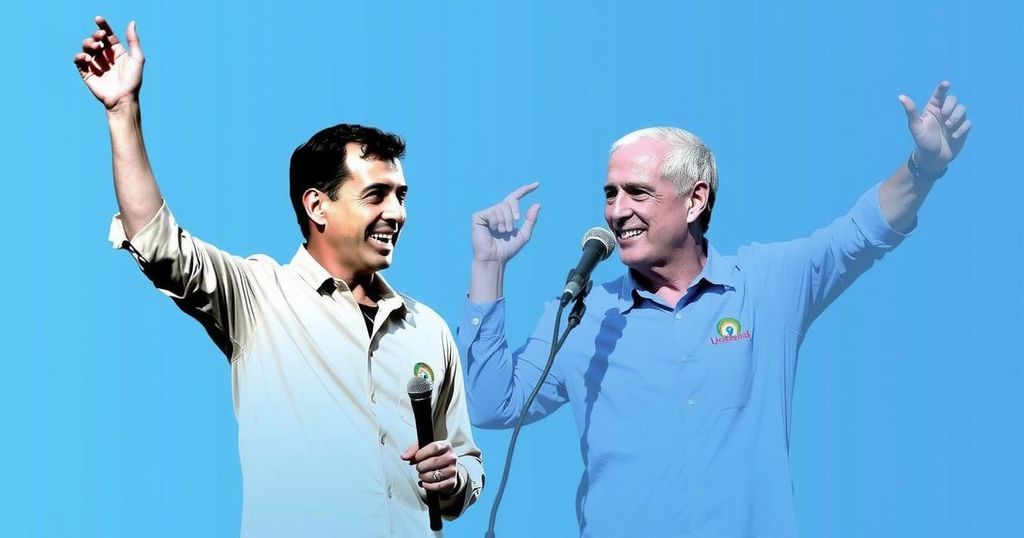Uruguay Voters Signal Runoff as Presidential Election Unfolds
In Uruguay’s presidential election, the leading candidates have confirmed a runoff will be necessary on November 24, with Yamandú Orsi of the leftist Broad Front leading, and Álvaro Delgado of the governing coalition as his rival. The election saw a voter turnout of 89% amidst concerns over crime and social issues. Uruguay’s current political climate stands in contrast to neighboring countries, reflecting stability and moderate satisfaction with governance, as key issues such as child poverty and economic management remain central to the electoral discourse.
In an unexpected outcome in Uruguay’s presidential election, the leading candidates have confirmed that the race has reached a crucial milestone requiring a second round of voting scheduled for November 24. An early count revealed that the moderate leftist alliance is currently in the lead, capturing significant support from the electorate. Yamandú Orsi, the former mayor endorsed by the leftist Broad Front alliance, and Álvaro Delgado, the candidate representing the conservative governing coalition, both addressed enthusiastic supporters shortly after midnight, signaling their intent to compete in the impending run-off. Preliminary reports indicate that roughly 60% of the ballots have been tallied, showcasing the high voter engagement typical of this nation. With an extraordinary voter turnout of 89% among 2.7 million eligible citizens, Uruguay continues to be recognized as a stable democracy where participation in elections is mandatory. Early exit polls indicated that Orsi would secure approximately 42% to 44% of the votes, leading the incumbent Delgado who was predicted to attain 27% to 28%. However, none of the candidates appeared capable of achieving the decisive 50% needed to avert a runoff, reflecting a concerning issue of voter engagement within the context of various pressing socio-economic challenges. As Uruguay stands apart from its neighbors Argentina and Brazil, where recent elections epitomized populist anger towards the political establishment, the sentiments in Uruguay appear to maintain a level of satisfaction with the incumbent administration led by President Luis Lacalle Pou. Under his leadership, the government has enjoyed a 50% approval rating, indicating a populace relatively pleased with its governance amidst issues concerning rising crime rates and significant child poverty. While the ongoing campaign has focused on escalating crime and economic responsibility, voters have also voiced concerns over educational standards and the welfare of children in poverty. Political analyst Julián Kanarek remarked on the lack of connection between candidates and the electorate, noting that this was a campaign “far removed from the people.” Orsi, drawing on his personal background and casual portrayal, has evoked nostalgic sentiments akin to those experienced during former President José “Pepe” Mujica’s tenure. Mujica, an iconic figure in Uruguayan politics and known for his humble lifestyle, emphasized the importance of endorsing democracy during his own voting experience. Furthermore, while the primary race continues, an ongoing constitutional referendum that seeks to enact transformative changes to Uruguay’s social security framework is consuming vast media and public attention. Both leading candidates oppose this proposal, which, if approved, would significantly alter the country’s fiscal landscape by expanding the retirement age and altering benefit structures.
The recent presidential election in Uruguay has revealed significant voter behavior and preferences that may stand in contrast to broader trends seen in South America. As the nation prepares for a runoff between leading candidates, voters have indicated a desire for governance that promotes social welfare in response to economic instabilities. Historically, the Broad Front coalition has been synonymous with progressive political transformations in Uruguay, leading the country through periods of social reform and economic development since 2005. However, recent campaigns may indicate fatigue among voters, reflecting concerns regarding social issues, public safety, and economic management. Uruguay’s recent political environment has also been deeply influenced by regional events, particularly the populist movements in neighboring countries that have responded to widespread dissatisfaction with the political status quo. This context renders Uruguay’s upcoming electoral decisions even more significant in comparison to its regional peers.
The dynamics of the upcoming Uruguayan presidential runoff illustrate the complexities of voter sentiment amidst socio-economic challenges that have characterized the pre-election environment. Candidates Yamandú Orsi and Álvaro Delgado must navigate the path toward appealing to an electorate concerned with crime and poverty, as they strive to define their platforms against the backdrop of a political landscape that remains cohesive yet increasingly charged with urgency. With a historical context anchoring the electorate’s preferences, both candidates face the critical task of resonating deeply with voters in advance of the November 24 runoff, and the potential implications for future governance in Uruguay are significant as the nation seeks to balance progressive aspirations with effective governance.
Original Source: www.firstpost.com




Post Comment